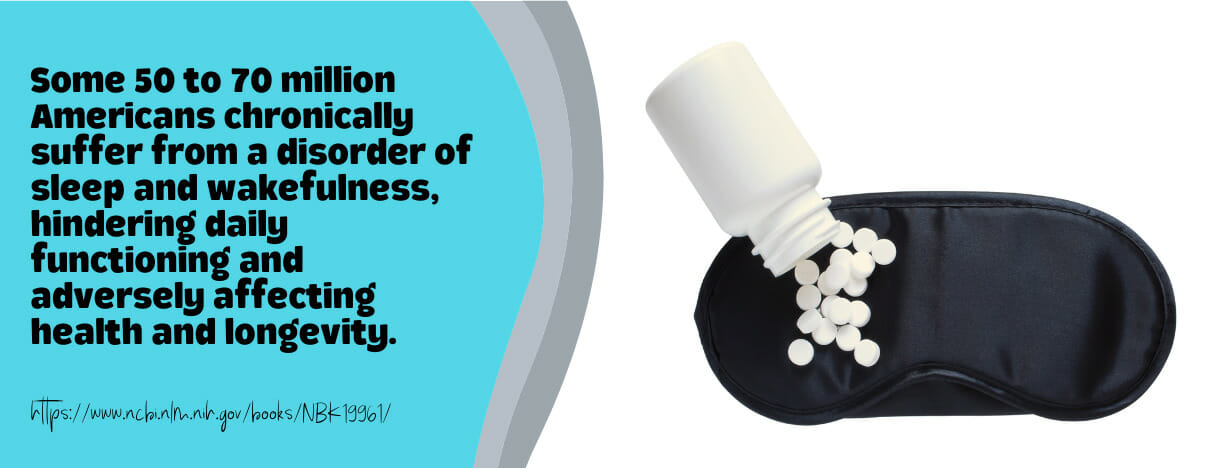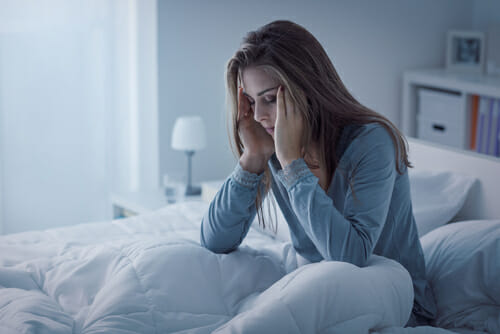
The quality of your sleep and your mental health are closely linked. People who have insomnia and other sleep disorders have been known to have a variety of mental health problems. And while Americans are notorious for sleep deprivation, people who have mental health issues are also more likely to have problems with daytime sleepiness. Sleep problems are also more common in those who struggle with depression, anxiety, attention deficit hyperactivity disorder, and bipolar disorder.

Historically, professionals treating people for psychiatric disorders have considered sleep disorders to be a symptom. However, newer research points to sleep disorders actually raising the risk of and contributing to psychiatric disorders. Thus, resolving a sleep disorder may help alleviate other psychiatric issues. Getting a good night’s sleep helps improve both emotional and mental health, helping you to maintain a positive outlook on life.
How Sleep Can Affect Mental Health
During a normal sleep cycle, you should go through two main phases of sleep every 90 minutes. The amount of time you spend in each phase changes as the night goes on.
The quiet sleep phase involves deepening sleep and is characterized by your body temperature dropping, your muscles relaxing, and your breathing and heart rate slowing. When you’re sleeping at the deepest level, your immune system is being rejuvenated.
The other sleep phase is called REM sleep; “REM” stands for “rapid eye movement.” Dreams occur during this phase. REM sleep is important for learning and memory, and it contributes to your overall emotional health. During REM sleep, your blood pressure, body temperature, and heart and breathing rates increase to roughly the same levels as when you’re awake. Sleep disruptions have a negative impact on your brain, impairing thought processes and emotional regulation.
- Sleep and Mental Health
- How Does Sleep Affect Mental Health?
- The Complex Relationship Between Sleep, Depression & Anxiety
- How Sleep Deprivation Hurts Mental Health
Psychological Effects of Sleep Deprivation
Scientists have discovered dozens of different types of sleep disorders. Insomnia is the most prevalent sleep disorder and is characterized by trouble either falling asleep or staying asleep. Another common sleep disorder is obstructive sleep apnea, a breathing issue that causes people to wake up repeatedly. Nighttime fidgeting is another common sleep disorder, as is narcolepsy, which is sudden extreme fatigue or falling asleep during the day.
- People with depression often experience sleep problems. Most often, patients who are depressed experience insomnia, but some may also have obstructive sleep apnea. Sleep problems increase the risk of depression, according to recent studies. People with depression who have untreated insomnia may not respond to treatment for depression.
- Bipolar disorder includes a combination of depressed and manic phases. During manic phases, it’s common for people to experience insomnia and a diminished need for sleep. Problems with insomnia often become worse right before a manic episode starts. The lack of sleep may even trigger a manic phase.
- People with an anxiety disorder such as post-traumatic stress disorder, panic disorder, or obsessive-compulsive disorder may have trouble sleeping. Insomnia may be a risk factor for anxiety disorders. Insomnia may also worsen anxiety symptoms.
- Sleep problems often go hand in hand with ADHD. People with ADHD often have trouble falling asleep, are restless while they sleep, and sleep for shorter periods. Children who have sleep disorders may be more likely to become hyperactive and inattentive.
What You Can Do to Improve Sleep and Mental Health
Anyone struggling with insomnia will likely receive a generalized treatment whether or not they have a psychiatric disorder as well. Treatments can include lifestyle changes, behavioral adaptations, psychotherapy, and/or medication.
- Reducing the use of caffeine, nicotine, and alcohol can help with insomnia. Alcohol begins as a depressant, but when the effects of the alcohol wear off, it’s typical for people to wake up. Nicotine and caffeine are both stimulants, which can interrupt normal sleep cycles.
- Getting regular cardiovascular exercise can help with sleep issues. People will usually fall asleep more readily, sleep more deeply, and wake up less often when they exercise regularly.
- Improving sleep habits usually helps people to get more and better sleep. Good sleep hygiene includes maintaining a set sleeping and waking schedule, sleeping in bed in a quiet bedroom, keeping your bedroom dark, and removing distractions such as computers and televisions from the bedroom.
- Meditation and deep breathing exercises can help induce calmness, which often helps to improve sleep.
- Cognitive-behavioral therapy can provide helpful techniques to improve sleep. A therapist can teach a patient how to build confidence and alter negative expectations, which can help with sleeping.
Mental Health Resources
- Sleep and Mental Health: The ability to cope with the demands of life is directly related to the quality of sleep you get.
- Mood and Sleep: Not getting enough sleep tends to make people feel irritable and low on energy.
- The Link Between Sleep and Mental Health: Anyone who has trouble falling asleep or staying asleep has a higher risk of developing depression.
- Tips for Better Sleep: Set a consistent time to go to sleep and wake up, and get regular exercise to improve your sleep habits.
- 12 Simple Tips to Improve Your Sleep: Designate your bedroom as a sleep-only zone to make it easier to fall asleep.
- Sleep Hygiene Tips: Try meditating and relaxing for an hour before you go to bed to make it easier to fall asleep and stay asleep.
- Sleep Tips: Six Tips for Better Sleep: Pay attention to the foods you eat to improve sleep, avoiding caffeine and large meals in the late afternoon and evening.
- Anxiety and Depression: Although anxiety and depression are different, they often occur together and can have similar triggers.
- Common Symptoms of Depression: Common symptoms of depression include sleeping and eating more or less than normal, feeling tired, and having unexplained aches and pains.
- Major Depression in Children: Major depression is more than just feeling sad; it’s a persistent sadness or irritability that affects all areas of life.
- Overview of Anxiety: A person with anxiety has distinct feelings of unease and apprehension in response to typical daily issues.
- Anxiety: What an Individual May Be Experiencing or Feeling: Feeling stressed has both psychological and physiological aspects, but anxiety is characterized by a debilitating amount of stress in response to everyday issues.
- Bipolar Disorder: Bipolar disorder may be diagnosed when someone has unusual mood changes that swing from very happy to very sad, often with no level mood in between them.
- What Is Bipolar Disorder? Bipolar disorder, formerly known as manic depression, causes severe highs and lows that can be debilitating.
- Overview of Bipolar Disorder: Many factors can play a role in the development of bipolar disorder, and the disorder can run in families.
- ADHD and Sleep: What’s the Connection? ADHD has a connection with sleep problems such as not wanting to go to bed, which can lead to sleep deprivation.
- What Can I Do When My Child Has Problems With Sleep? Kids with ADHD often have sleep problems, which can make it even more difficult to manage their behavior.
- Improving Sleep Can Aid Recovery of Veterans With PTSD and TBI: People with PTSD often report sleep disturbances, which can exacerbate their symptoms.
- Post-Traumatic Disorder: Flashbacks are a frequent symptom of PTSD, which can cause sleep disturbances.
- How Can Suicide Be Prevented? Being watchful for signs of deep depression is an important way to help a loved one and prevent suicide.
- Suicide Prevention Tips for Youth and Young Adults: If someone talks about wanting to die or be dead or you notice self-harming behavior, seek help immediately.
- Eating Disorders: Eating disorders include anorexia and bulimia nervosa and binge-eating disorder, all of which cause abnormal eating patterns.
- Night Eating Syndrome: Nocturnal eating syndrome is a rare disorder that involves eating during sleep without the person being aware of the activity.
- Sleep Extension as an Intervention for Sleep-Related Disorder: Treatment for nocturnal eating syndrome can include extending sleep time at night, adding a nap during the day, and setting an alarm or door buzzer to make the sleeper aware of the nocturnal activity.
- Eating and Sleep Disorders: Both eating and sleep disorders have become common maladies for Americans.